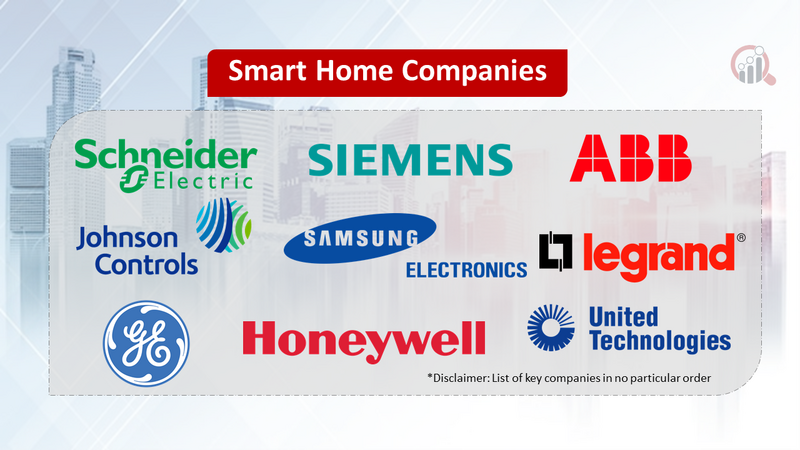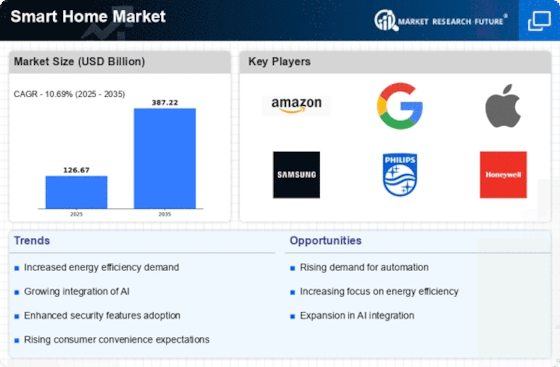Top Industry Leaders in the Smart Home Market

Competitive Landscape of the Smart Home Market:
The global smart home market is experiencing remarkable growth, driven by factors like increasing consumer demand for convenience, security, and energy efficiency. This burgeoning market presents a dynamic competitive landscape, teeming with established players and emerging newcomers vying for a slice of the pie.
Key Players:
- Siemens AG (Germany)
- Johnson Controls Inc (US)
- Legrand S.A. (France)
- Samsung Electronics Co. Ltd (South Korea)
- ABB Lid. (Switzerland)
- Honeywell International Inc. (US)
- United Technologies Corporation (US)
- Schneider Electric (France)
- General Electric Company (US)
Strategies Adopted:
To stand out in this competitive landscape, companies are adopting various strategies:
- Product Innovation: Continuous development of new and improved smart home devices with enhanced functionality, interoperability, and user experience is a key strategy.
- Strategic Partnerships: Companies are forging partnerships with other players in the ecosystem to expand their product offerings and reach new customer segments.
- Open Platforms: An open approach allows devices from different manufacturers to work together, increasing customer choice and flexibility.
- Subscription Services: Companies are offering subscription models, providing access to additional features and services, recurring revenue streams.
- AI Integration: Artificial intelligence is being leveraged to personalize user experience, automate tasks, and enhance security.
- Focus on Specific Segments: Companies are focusing on specific segments like healthcare, elderly care, and energy management to cater to niche markets.
Factors for Market Share Analysis:
Several factors are crucial for analyzing market share within the smart home landscape:
- Brand Recognition: Established brands with strong consumer trust tend to hold a significant market share.
- Product Portfolio: Companies offering a comprehensive range of compatible devices across various categories stand out.
- Pricing Strategy: Competitive pricing, particularly for entry-level products, attracts price-conscious consumers.
- Distribution Channels: Strong partnerships with retailers and service providers widen market reach.
- Security Features: Robust security features and data privacy initiatives are crucial for gaining customer trust.
- Integration Capabilities: Seamless integration with other smart home platforms and voice assistants is essential.
- User Experience: A user-friendly interface and intuitive app design promote user adoption and satisfaction.
New and Emerging Companies:
The smart home market is witnessing a surge of new entrants, bringing fresh ideas and innovation:
- Niche-focused Companies: Companies like Wyze, specializing in affordable smart cameras, and Notion, offering smart sensors for home automation, are gaining traction with their targeted solutions.
- Open-source Platforms: Platforms like Home Assistant and OpenHAB are empowering DIY enthusiasts to build customized smart home solutions, attracting tech-savvy consumers.
- Voice Assistant Integration: Companies like Mycroft and Snips are developing open-source voice assistants, offering alternatives to dominant players like Google and Amazon.
- AI and Machine Learning: Companies like Owlet (baby monitoring) and SmartThings (behavioral analytics) are leveraging AI for personalized experiences and predictive automation.
Current Investment Trends:
Technology giants are investing heavily in AI, machine learning, and voice assistant development to enhance the smart home experience. Venture capitalists are increasingly backing startups with innovative technologies and niche solutions. Additionally, partnerships and acquisitions are prevalent as companies seek to expand their product portfolios and market reach.
Latest Company Updates:
October 2023 -
Yale has revealed the introduction of Sync Smart Home Alarm Kit that will be accessible exclusively to only trade members and has been made considering the installers. The exclusive kit offers everything required for installing a complete smart home alarm system on the standard residential property in one box. The dedicated Yale after sales support, this Kit also offers a 5-year warranty, a transformation from the standard 2 years that may be transferred to an end user for reducing the requirement for call backs. One of its standout features is the geolocation capability. The smart feature sends reminder for settling the alarm when this recognises that the homeowner is in fact leaving the property. This kit will also integrate with various smart home products & accessories within the Yale range that includes Yale Smoke Detector, Yale Water Sensor, and Yale Smart Plug. Besides, this kit is connected intelligently and seamlessly integrates with Amazon Alexa, Google Assistant, and Philips Hue, combining voice control and lighting for creating the best security system.
August 2023 - Reliance Jio has lately launched Jio Smart Home Services which will enable users in controlling home appliances seamlessly. Above all these services is poised in redefining how they experience as well as manage their homes.
July 2023 -
Versuni, formerly called Philips domestic appliances expanded into the home safety product. The new range comprise a novel Home Safety app and three smart security cameras. The company claims thar these solutions will merge AI, reliability, and user friendliness to offer users an array of perks.










